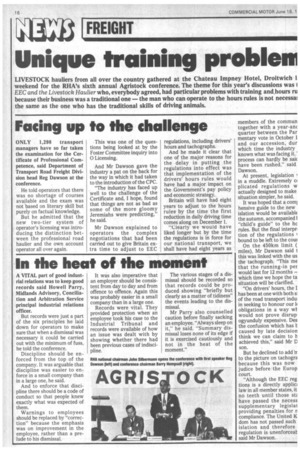In the heat of the moment
Page 18

If you've noticed an error in this article please click here to report it so we can fix it.
A VITAL part of good industrial relations was to keep good records said Howell Parry, Midlands Advisory, Conciliation and Arbitration Service principal industrial relations officer.
But records were just a part of the six principles he laid down for operators to make sure that when a dismissal was necessary it could be carried out with the minimum of fuss, he told the conference.
Discipline should be enforced from the top of the company. It was arguable that discipline was easier to enforce in a small company than in a large one, he said.
And to enforce that discipline there should be a code of conduct so that people knew exactly what was expected of them.
Warnings to employees should be replaced by "correction" because the emphasis was on improvement in the employee, rather than a prelude to his dismissal. It was also imperative that an employer should be consistent from day to day and from offence to offence. Again this was probably easier in a small company than in a large one.
Records were vital. They provided protection when an employee took his case to the Industrial Tribunal and records were available of how an issue was dealt with by showing whether there had been previous cases of indiscipline. The various stages of a dismissal should be recorded so that records could be produced showing "briefly but clearly as a matter of tidiness" the events leading to the dismissal.
Mr Parry also counselled caution before finally sacking an employee. "Always sleep on it," he said. "Summary dismissal loses none of its edge if it is exercised cautiously and not in the heat of the moment."
















































































































